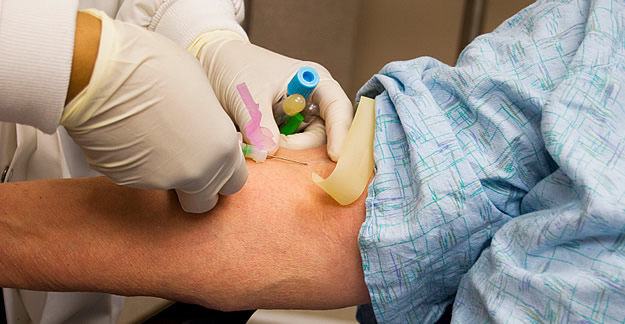Hospitalized patients are often subject to many diagnostic tests like blood labs, MRIs and scans, and more. Some of the tests that doctors order may not be necessary. But how do we, as patients, know when to question a test or scan?
I spoke with Adam Corson, MD, about that issue. He was featured in an article by Choosing Wisely because he tracked doctors’ requests for tests in his hospital system, Swedish Medical Center in the Seattle area, and got them to cut back on testing.

Adam Corson, MD
By analyzing the testing data, Dr. Corson noticed certain team members ordered substantially more tests than others. He then began an email campaign asking the team to stop ordering daily tests and educating them on how excessive testing can harm patients. His educational campaign worked, reducing the number of tests by 14,000 a year.
Labwork on blood is one diagnostic tests that is often performed more frequently than necessary. If you’re in the hospital and your blood is being drawn every day for tests, “The doctor might have put in a standing order, which you might want to question, or it could be that each day I’m evaluating the labs and ordering another set the next day.” The time to question your doctor is after you have received blood tests for 2 or 3 consecutive days. Dr. Corson suggests, “You might say, ‘I notice that you are getting labs on me every day. What is it you are following?’ It helps you as the patient understand your care better and gets the doctor to consider if labs are necessary on a daily basis.”
What’s the harm in diagnostic tests the blood daily? According to Choosing Wisely, “Hospitalized patients frequently have considerable volumes of blood drawn (phlebotomy) for diagnostic testing during short periods of time,” which can lead to anemia. “This anemia, in turn, may have significant consequences, especially for patients with cardiorespiratory diseases.” Plus, it’s a lot of needle sticks in the arm!
The Patient’s Role in Cutting Back on Tests
What is the patient’s role in avoiding unnecessary tests? Don’t ask for tests if your doctor isn’t recommending them. “Patients have an inherent expectation that something should be done or a specialist should be seen even when I tell them there is nothing to warrant further tests,” Dr. Corson explains.
CT scans and MRIs are not recommended after a fall, but they are often ordered. “Radiographic tests are one area that you may want to question,” Dr. Corson says. “Especially in younger patients. Testing is a complex area. They can cause a ripple effect. Radiographic scans are notorious for coming back clean for the primary concern, but something else shows up like a spot on the adrenal gland. What do you do then?”
Tests should be ordered only to help answer clinical questions, or when doing so will affect treatment management. Dr. Corson suggests that when a doctor orders a test, asking a few simple questions may ease your concerns. “Ask, ‘Why are you ordering the test? What are you looking for?’ and ‘What might we do with the results?’ ”
Choosing Wisely has a complete list of questions (pdf) to ask your doctor before getting a test. Being an active partner in your health care is the best path to health for us all.







